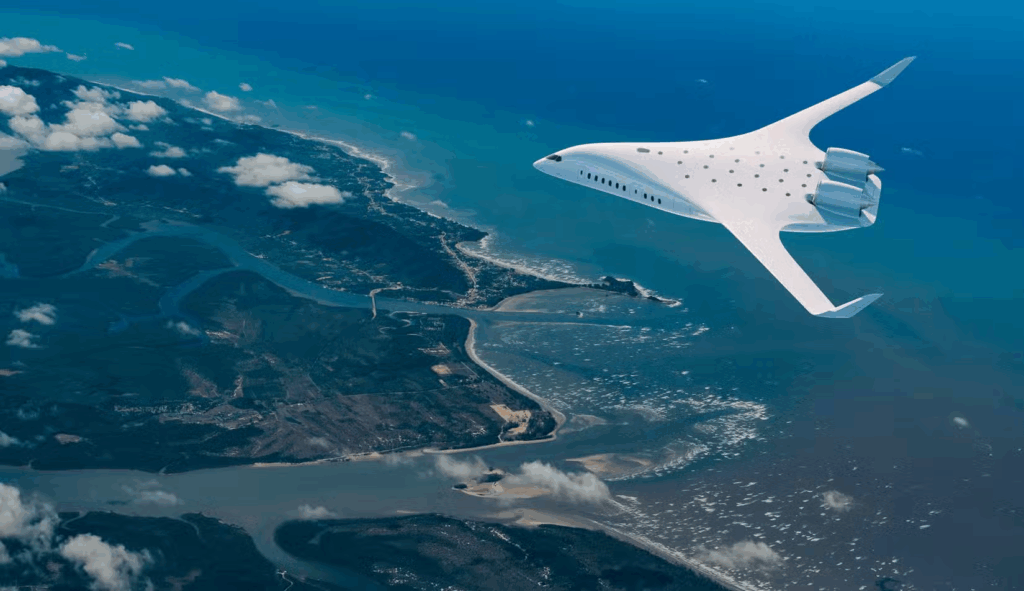United Airlines, one of the largest airlines in the world, has made headlines with its announcement to acquire up to 200 blended-wing body (BWB) aircraft, marking a significant step in the evolution of commercial aviation. This innovative aircraft design promises to enhance fuel efficiency, reduce operational costs, and contribute to the airline’s sustainability goals, all while catering to growing passenger demand. The decision to pursue BWB technology underscores United’s commitment to leading the industry in both operational excellence and environmental responsibility as it strives to minimize its carbon footprint amid increasing regulatory pressures and public concern over climate change.

The acquisition agreement with JetZero is conditional upon the successful flight of a full-scale demonstrator planned for 2027, allowing United Airlines to maintain strategic flexibility while evaluating the technological viability of the BWB design.
This approach is part of a broader portfolio strategy that includes investments in hybrid-electric and hydrogen-powered aircraft, positioning United at the forefront of sustainable aviation innovation. The initiative has generated considerable interest within the airline industry, as it reflects a growing trend toward adopting advanced technologies that can enhance passenger experience while adhering to environmental, social, and governance (ESG) commitments.
Prominent discussions surrounding the acquisition center on the potential environmental benefits of BWB aircraft, which could achieve up to a 50% reduction in fuel consumption per passenger mile compared to traditional aircraft designs. These advantages not only promise improved profitability for United but also set a benchmark for other airlines considering similar investments in sustainable technologies.
However, challenges remain, including the successful development and market acceptance of the BWB aircraft, which could impact United’s operational plans and competitive positioning in the airline industry.
As United Airlines embarks on this ambitious journey, the ramifications of its acquisition strategy extend beyond its own operations. The move is likely to influence competitive dynamics within the airline sector, prompting other carriers to explore advanced aircraft technologies to enhance their own sustainability efforts and maintain market relevance in an increasingly eco-conscious environment.
Commenting on the deal, Tom O’Leary, CEO and Co-Founder of JetZero, explained that:
“United’s investment in our company signals the industry’s belief that new, innovative technology is needed in order to achieve the efficiency and cost savings that will be required to meet the continued growth in demand for air travel across the globe. JetZero is focused on one key technology – the airframe – that enables us to address all of the barriers to growth. This program is the only one in development today that promises efficiency and an elevated customer experience”
Acquisition Plans

United Airlines has announced a conditional purchase agreement with JetZero to acquire up to 200 blended-wing body (BWB) aircraft. This agreement includes an option for an additional 100 aircraft in the future, contingent upon JetZero achieving certain development milestones, particularly the successful flight of a full-scale demonstrator planned for 2027. The conditional nature of this purchase agreement allows United Airlines to maintain strategic flexibility. By tying the acquisition to specific development milestones, the airline can evaluate JetZero’s technical progress before making a firm commitment to production orders. This approach enables United to retain its competitive positioning should the technology prove successful, while also mitigating risks associated with technological uncertainty.
This investment aligns with the dual mandate of United Airlines Ventures, which focuses on enhancing customer experience and addressing carbon emissions. Instead of committing to a single technological pathway, United is adopting a portfolio strategy for future fleet development.
This includes investments in hybrid-electric, hydrogen-powered, and electric air taxi technologies, alongside the BWB concept proposed by JetZero. Moreover, the announcement is marked by forward-looking statements that reflect the airline’s environmental, social, and governance (ESG) goals, emphasizing a commitment to innovation and sustainability within the aviation sector. However, the realization of these plans is subject to various risks and uncertainties, including the successful development and market viability of the proposed technologies, as well as meeting projected ESG targets.
By Aeropeep Team
#UnitedAirlines #JetZero #AviationInnovation #BlendedWingBody #SustainableAviation #AircraftDesign #FutureOfFlight #NextGenAircraft





